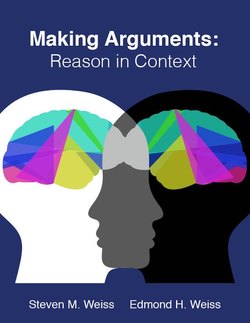Читать книгу Making Arguments: Reason in Context - Edmond H. Weiss - Страница 9
На сайте Литреса книга снята с продажи.
How We Argue: The Principles of Argumentation
ОглавлениеNearly everyone argues. In fact, some people argue so much that we have an adjective that describes them—argumentative. The connotation of this adjective is nearly universally negative. One Communication Theory student, when asked to describe a person she didn't like, provided this description: “He's disagreeable. He challenges me on everything. He's one argumentative son of a gun.”
From the time we are young we are admonished against arguing. “Don't argue with your sister.” “Don't talk back to me.” “I really don't want to argue about this.” Our language and behavior are full of restrictions against arguing. In many situations, arguing is construed as downright rude and offensive. Moreover, arguing with those in authority, including those who have real power over the circumstances in our lives, is profoundly discouraged. Many individuals are hesitant to confront teachers, police officers, and clergy. Many are conditioned to “bite their tongues” when the social conditions for argumentation put them at a perceived disadvantage.
Yet the discouragement of argumentativeness—as well as the social pressure to refrain from arguing—is ironic, when one considers that our society values the ability to argue perhaps above all other abilities. Nearly every important profession and activity is dependent upon success in argumentation. Jurisprudence, politics, religion, and education are highly regarded and widespread vocations that rely on sound argumentative practice. Less obviously, science, the arts, and medicine reward persons with a facility in arguing. And some professions—sales, advertising, and investing, for examples—make such obvious use of argumentation as to become “paradigm cases” of what it means to argue for a living.
The degree to which argumentative ability is rewarded and valued in our culture is not surprising. We exist in an environment where good jobs, good educations, healthful choices, and informed decisions all purport to promote the quality of our lives. Being able to argue well, and effectively, is perceived as closely connected to personal and societal success. Moreover, the ability to discriminate good arguments from specious ones, sound plans from half-baked schemes, helps all of us recognize the best courses of action, pursue the best kinds of living.
So why the contradiction? Why on the one hand is arguing so frowned upon, and on the other so lauded? We know that if we were ever in legal trouble, we would want to hire an attorney with good skills of advocacy. But, in ordinary social circumstances, would we find that tenacious and effective attorney to be abrasive or disagreeable?
The apparent contradiction, the opposite values attached to the powers of argumentation and the traits of argumentativeness, derives from several myths and misconceptions. Let us address the confusion with some principles that clarify what arguing really is:
